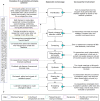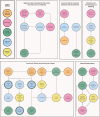The impact of COVID-19 on young people's mental health, wellbeing and routine from a European perspective: A co-produced qualitative systematic review
- PMID: 38507395
- PMCID: PMC10954119
- DOI: 10.1371/journal.pone.0299547
The impact of COVID-19 on young people's mental health, wellbeing and routine from a European perspective: A co-produced qualitative systematic review
Abstract
Background: The impact of the Covid-19 pandemic on young people's (YP) mental health has been mixed. Systematic reviews to date have focused predominantly on quantitative studies and lacked involvement from YP with lived experience of mental health difficulties. Therefore, our primary aim was to conduct a qualitative systematic review to examine the perceived impact of the Covid-19 pandemic on YP's (aged 10-24) mental health and wellbeing across Europe.
Methods and findings: We searched MEDLINE, PsycINFO, Embase, Web of Science, MEDRXIV, OSF preprints, Google, and voluntary sector websites for studies published from 1st January 2020 to 15th November 2022. European studies were included if they reported qualitative data that could be extracted on YP's (aged 10-24) own perspectives of their experiences of Covid-19 and related disruptions to their mental health and wellbeing. Screening, data extraction and appraisal was conducted independently in duplicate by researchers and YP with lived experience of mental health difficulties (co-researchers). Confidence was assessed using the Confidence in the Evidence from Reviews of Qualitative Research (CERQual) approach. We co-produced an adapted narrative thematic synthesis with co-researchers. This study is registered with PROSPERO, CRD42021251578. We found 82 publications and included 77 unique studies in our narrative synthesis. Most studies were from the UK (n = 50; 65%); and generated data during the first Covid-19 wave (March-May 2020; n = 33; 43%). Across the 79,491 participants, views, and experiences of YP minoritised by ethnicity and sexual orientation, and from marginalised or vulnerable YP were limited. Five synthesised themes were identified: negative impact of pandemic information and restrictions on wellbeing; education and learning on wellbeing; social connection to prevent loneliness and disconnection; emotional, lifestyle and behavioural changes; and mental health support. YP's mental health and wellbeing across Europe were reported to have fluctuated during the pandemic. Challenges were similar but coping strategies to manage the impact of these challenges on mental health varied across person, study, and country. Short-term impacts were related to the consequences of changing restrictions on social connection, day-to-day lifestyle, and education set-up. However, YP identified potential issues in these areas going forward, and therefore stressed the importance of ongoing long-term support in education, learning and mental health post-Covid-19.
Conclusions: Our findings map onto the complex picture seen from quantitative systematic reviews regarding the impact of Covid-19 on YP's mental health. The comparatively little qualitative data found in our review means there is an urgent need for more high-quality qualitative research outside of the UK and/or about the experiences of minoritised groups to ensure all voices are heard and everyone is getting the support they need following the pandemic. YP's voices need to be prioritised in decision-making processes on education, self-care strategies, and mental health and wellbeing, to drive impactful, meaningful policy changes in anticipation of a future systemic crisis.
Copyright: © 2024 Dewa et al. This is an open access article distributed under the terms of the Creative Commons Attribution License, which permits unrestricted use, distribution, and reproduction in any medium, provided the original author and source are credited.
Conflict of interest statement
The authors have declared that no competing interests exist.
Figures





Similar articles
-
Survivor, family and professional experiences of psychosocial interventions for sexual abuse and violence: a qualitative evidence synthesis.Cochrane Database Syst Rev. 2022 Oct 4;10(10):CD013648. doi: 10.1002/14651858.CD013648.pub2. Cochrane Database Syst Rev. 2022. PMID: 36194890 Free PMC article.
-
How lived experiences of illness trajectories, burdens of treatment, and social inequalities shape service user and caregiver participation in health and social care: a theory-informed qualitative evidence synthesis.Health Soc Care Deliv Res. 2025 Jun;13(24):1-120. doi: 10.3310/HGTQ8159. Health Soc Care Deliv Res. 2025. PMID: 40548558
-
Measures implemented in the school setting to contain the COVID-19 pandemic.Cochrane Database Syst Rev. 2022 Jan 17;1(1):CD015029. doi: 10.1002/14651858.CD015029. Cochrane Database Syst Rev. 2022. Update in: Cochrane Database Syst Rev. 2024 May 2;5:CD015029. doi: 10.1002/14651858.CD015029.pub2. PMID: 35037252 Free PMC article. Updated.
-
Antibody tests for identification of current and past infection with SARS-CoV-2.Cochrane Database Syst Rev. 2022 Nov 17;11(11):CD013652. doi: 10.1002/14651858.CD013652.pub2. Cochrane Database Syst Rev. 2022. PMID: 36394900 Free PMC article.
-
Gender differences in the context of interventions for improving health literacy in migrants: a qualitative evidence synthesis.Cochrane Database Syst Rev. 2024 Dec 12;12(12):CD013302. doi: 10.1002/14651858.CD013302.pub2. Cochrane Database Syst Rev. 2024. PMID: 39665382
Cited by
-
Mental health inequalities, challenges and support needs during COVID-19: a qualitative study of 14-to-25-year-olds in London.BMJ Open. 2024 Apr 2;14(4):e080161. doi: 10.1136/bmjopen-2023-080161. BMJ Open. 2024. PMID: 38569680 Free PMC article.
-
Coproducing COVID-19 Health Information Resources: A Participatory Study With Older Adults From Minoritised Ethnic Communities in the UK.Health Expect. 2025 Aug;28(4):e70370. doi: 10.1111/hex.70370. Health Expect. 2025. PMID: 40771047 Free PMC article.
-
Socio-demographic and clinical predictors of post-acute, mid-and long-term psychological sequelae of COVID-19: a two-year cross-sectional investigation on 1317 patients at the University Hospital of Verona.Arch Public Health. 2024 Oct 31;82(1):198. doi: 10.1186/s13690-024-01426-x. Arch Public Health. 2024. PMID: 39482728 Free PMC article.
-
Who accessed STI testing in Britain during the COVID-19 pandemic and how: Findings from Natsal-COVID, a cross-sectional quasi-representative survey.Int J STD AIDS. 2024 Nov;35(13):1055-1071. doi: 10.1177/09564624241277582. Epub 2024 Sep 11. Int J STD AIDS. 2024. PMID: 39259923 Free PMC article.
-
The Effects of General Mental Health Symptomatology, COVID Anxiety, and Sociodemographic Factors on Pandemic-Induced Negative and Positive Trauma Effects: A Polish Survey from the Late Stages of the Pandemic.J Clin Med. 2025 May 12;14(10):3343. doi: 10.3390/jcm14103343. J Clin Med. 2025. PMID: 40429339 Free PMC article.
References
-
- Digital N. Mental Health of Children and Young People in England 2022—wave 3 follow up to the 2017 survey UK2022 [31/03/2023]. https://digital.nhs.uk/data-and-information/publications/statistical/men....
Publication types
MeSH terms
LinkOut - more resources
Full Text Sources
Medical

